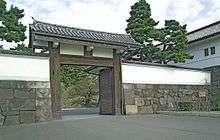Man'en
Man'en (万延) was a Japanese era name (年号,, nengō,, lit. "year name") after Ansei and before Bunkyū. This period spanned the years from March 1860 through February 1861.[1] The reigning emperor was Kōmei-tennō (孝明天皇).
| History of Japan |
|---|
 |
Change of era
- March 18, 1860 (Man'en 1 (万延元年)): The new era name was created to mark the destruction caused by a fire at Edo Castle and the assassination of Ii Naosuke (also known as "the disturbance" or "the incident" at the Sakurada-mon).[2] The previous era ended and a new one commenced in Ansei 7.
The new era name is derived from an hortatory aphorism to be found in The Book of the Later Han: "With 100,000,000,000 descendants, your name will forever be recorded" (豊千億之子孫、歴万載而永延).
Events of the Man'en era
- 1860 (Man'en 1): First Western professional photographer to establish residence in Japan, Orrin Freeman began living in Yokohama[3]
- 1860 (Man'en 1): First foreign mission to the United States.[4]
Gallery
 Edo Castle's Sakurada Gate (Sakurada-mon): The assassination of Ii Naosuke occurred nearby.
Edo Castle's Sakurada Gate (Sakurada-mon): The assassination of Ii Naosuke occurred nearby.
gollark: Imagine programming in esolangs other than ECMAScript.
gollark: Hmm, so it just LOOKS like JS, but it is secretly NOT JS, interesting.
gollark: Hey, maybe I should rewrite my eternally unfinished project in ReasonML or something. It'll never be finished either way.
gollark: I like the whitespacelessness.
gollark: Why is that different to regular calls?
Notes
- Nussbaum, Louis-Frédéric. (2005). "Man'en" Japan Encyclopedia, p. 607, p. 607, at Google Books; n.b., Louis-Frédéric is pseudonym of Louis-Frédéric Nussbaum, see Deutsche Nationalbibliothek Authority File Archived 2012-05-24 at Archive.today.
- Satow, Ernest Mason et al. (1905). Japan 1853-1864, Or, Genji Yume Monogatari, p. 38.
- Hannavy, John. (2007). Encyclopedia of Nineteenth-century Photography, Vol. 1, p. 770., p. 770, at Google Books
- Press release: "First Japanese Diplomatic Mission to U.S. Is Subject of May 24 Lecture," Library of Congress, April 16, 2010.
References
- Nussbaum, Louis Frédéric and Käthe Roth. (2005). Japan Encyclopedia. Cambridge: Harvard University Press. ISBN 978-0-674-01753-5; OCLC 48943301
- Satow, Ernest Mason and Baba Bunyei. (1905). Japan 1853-1864, Or, Genji Yume Monogatari. Tokyo: Naigai suppan kyokai (内外出版協會). OCLC 1384148
External links
- National Diet Library, "The Japanese Calendar" Link to historical overview plus illustrative images from library's collection
| Preceded by Ansei (安政) |
Era or nengō Man'en (万延) 1860–1861 |
Succeeded by Bunkyū (文久) |
This article is issued from Wikipedia. The text is licensed under Creative Commons - Attribution - Sharealike. Additional terms may apply for the media files.